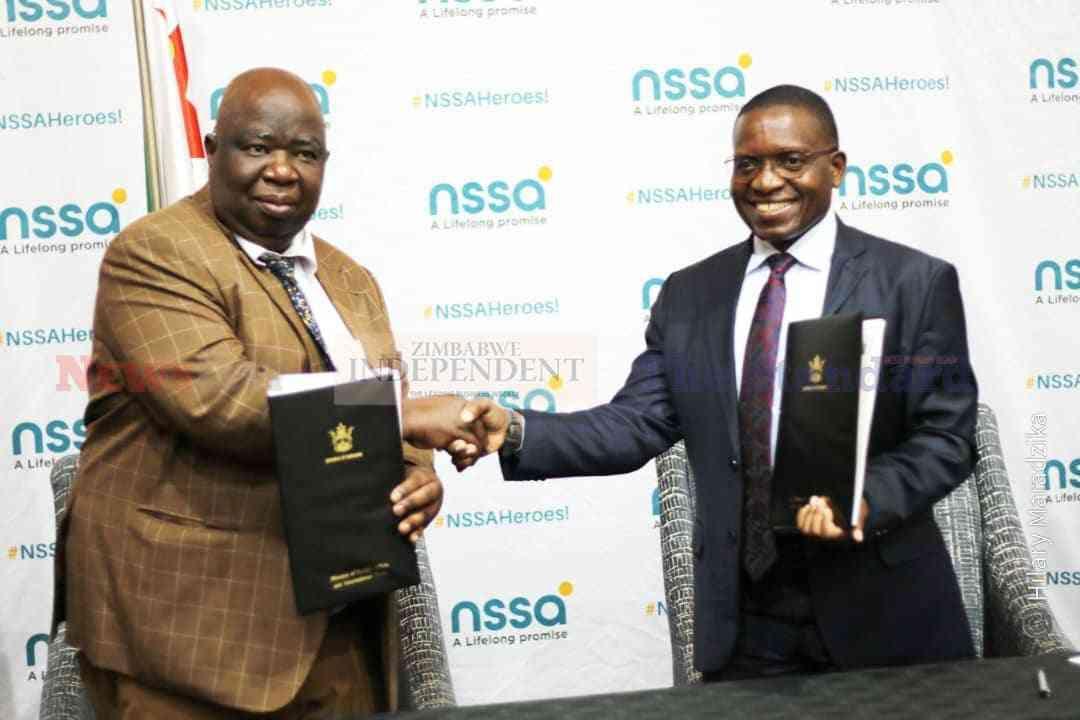Africa-Press – Zimbabwe. ZIMBABWEAN miners who developed silicosis, a form of tuberculosis, while working in South African gold mines are set to receive compensation following the launch of a collaborative initiative between the National Social Security Authority (NSSA) and Tshiamiso Trust.
The programme aims to help ex-mine workers and their dependents with medical assessments and lodge claims for compensation in Zimbabwe rather than traveling to South Africa to access the facilities.
According to the agreement, Baines Occupational Health Services clinics in Harare, Gweru and Bulawayo have been selected to handle the claims.
Speaking during the launch and signing of a memorandum of understanding, Tshiamiso Trust chief executive officer Munyadziwa Kwinda said the launch of the service represents a critical milestone in their regional mandate to reach eligible claimants across South Africa.
“We are honoured to mark this moment in partnership with the Government of Zimbabwe and NSSA,” he said.
“Thousands of Zimbabwean ex-mine workers have been waiting for Tshiamiso Trust services to commence so that they can access compensation that they may qualify for and today’s agreement means they can now lodge their claims and complete the medical assessment required to determine their eligibility for compensation.
“This is about restoring dignity and delivering on the promises made to the men and families who built the mining industry.”
Added Kwinda: “Thanks to collaboration with the NSSA and the Government of Zimbabwe, we are now able to bring these services to your doorstep.
“This is no small feat. It represents the power of partnership — between nations, between institutions, and most importantly, between people united by a shared commitment to justice.”
Eligible former mine workers can now submit claims locally and undergo the required benefit medical examinations.
Families of deceased mine workers will also be able to lodge claims on behalf of those who have passed away.
However, he clarified that this compensation scheme does not cover everyone.
The Tshiamiso Trust was established following a settlement agreement in which six mining companies agreed to compensate workers who sustained permanent lung damage due to silicosis or work-related illnesses while employed at their gold mines between March 12, 1965 and December 10, 2019.
The companies involved are African Rainbow Minerals, Anglo America South Africa, AngloGold Ashanti, Harmony Gold, Sibanye Stillwater and Gold Fields.
Claims will only be considered for those who worked at one of the 82 qualifying gold mines during the specified period and assessments will determine if they meet stringent medical eligibility criteria.
Ex-miners will undergo benefit medical examinations, which include X-rays and lung function tests.
For deceased miners, the criteria differ; for tuberculosis claims, evidence must show that they died from TB within a year of leaving the mine.
For silicosis claims, evidence must demonstrate that they died from silicosis, or, if the miner passed away between January 1, 2008 and December 10, 2019, that they had silicosis meeting specific requirements.
“For deceased mineworkers, the criteria is different.
“For TB claims, there must be evidence that they died from TB within a year of leaving the mine.
“For silicosis claims, there must be evidence that they died from silicosis, or — if the mineworker died between January 1, 2008 and December 10, 2019 — there must be evidence that they had silicosis that meets certain requirements.”
NSSA chief executive officer Charles Shava said the partnership is an important step in social protection for the mine workers and their families as it brings closure and shows social responsibility by the mines to compensate the affected.
“… through this collaboration, we are ensuring that those who qualify can now access the compensation due to them closer to where they live.
“NSSA remains committed to working with regional partners like Tshiamiso Trust to expand social security and strengthen Cosa border protection for our workers.”
For More News And Analysis About Zimbabwe Follow Africa-Press






